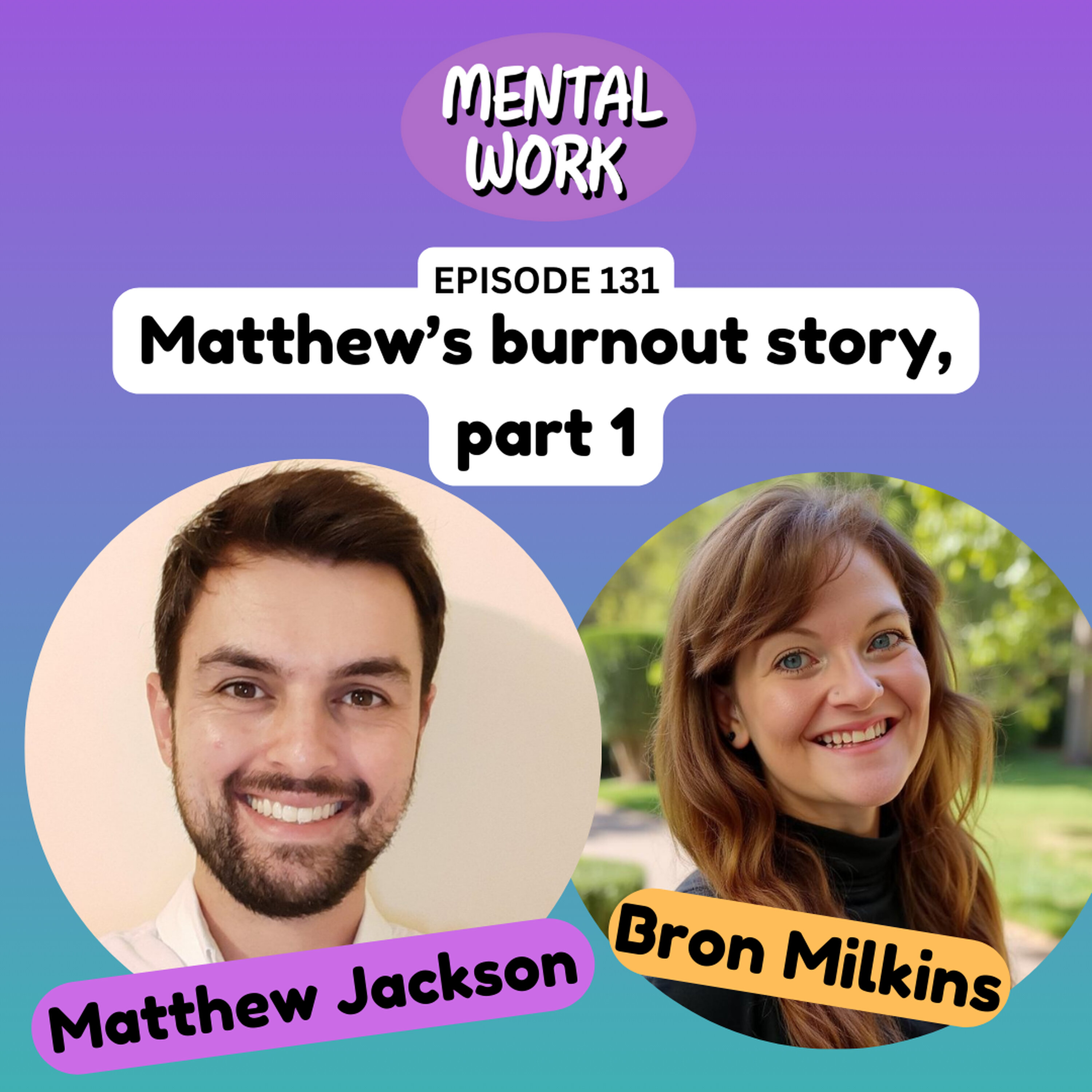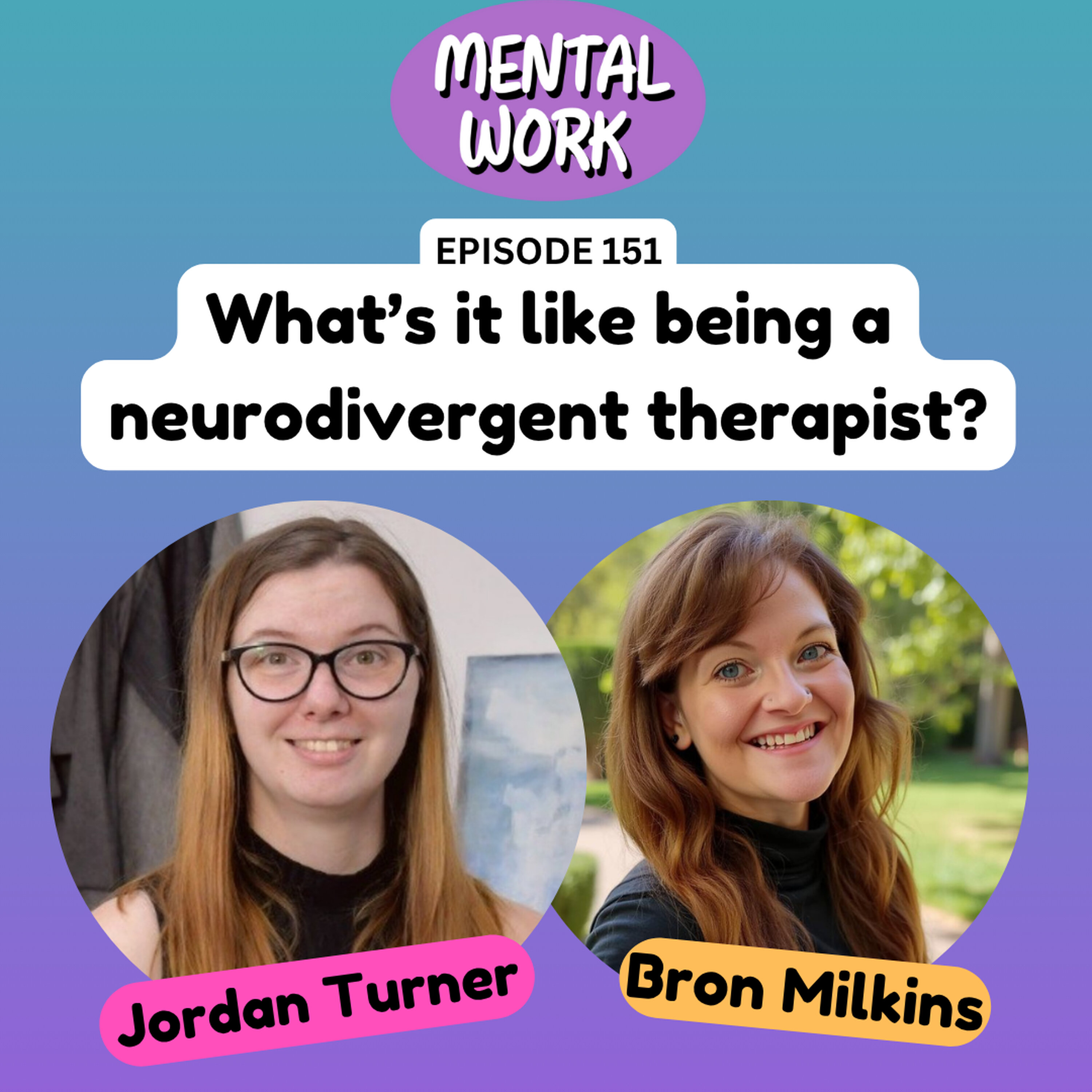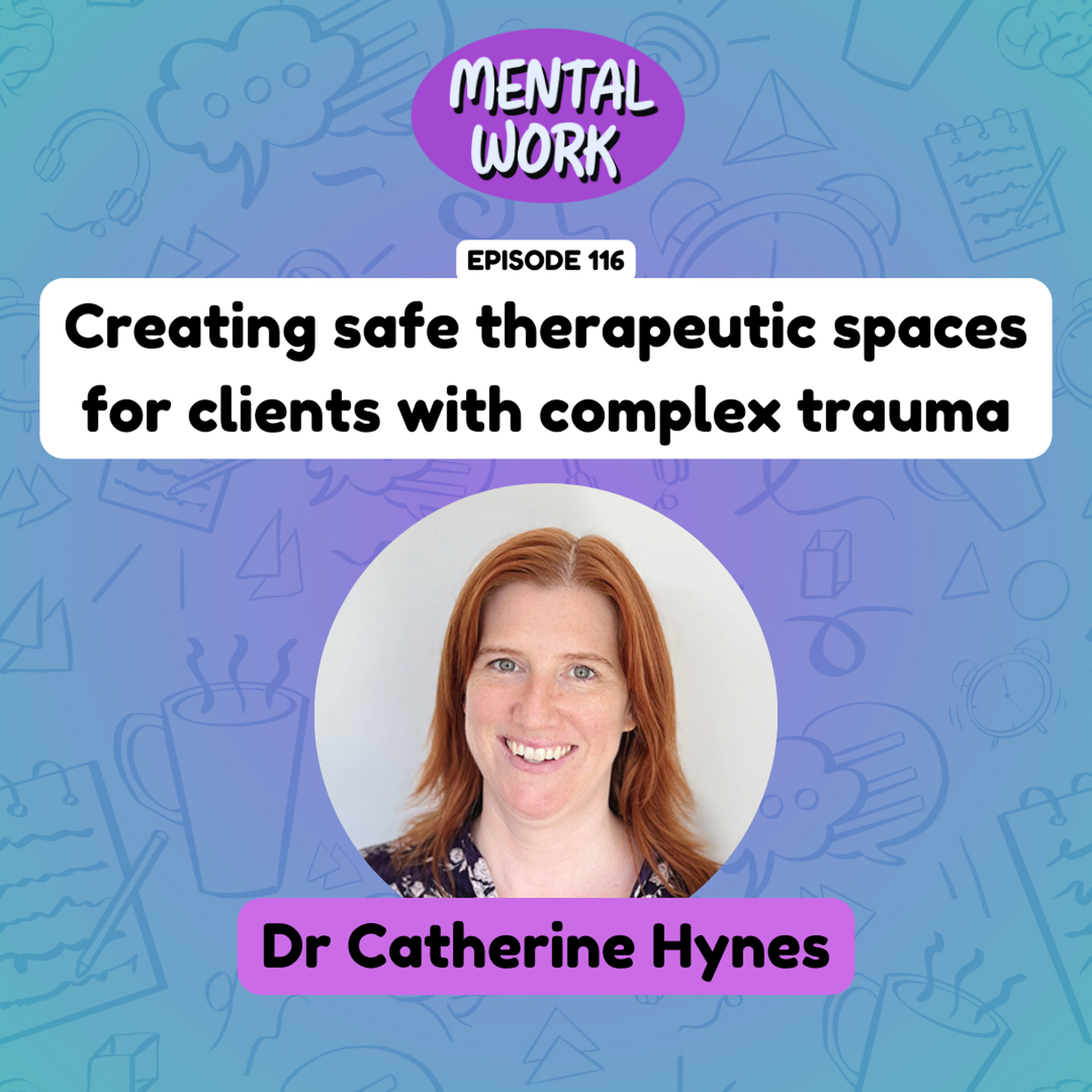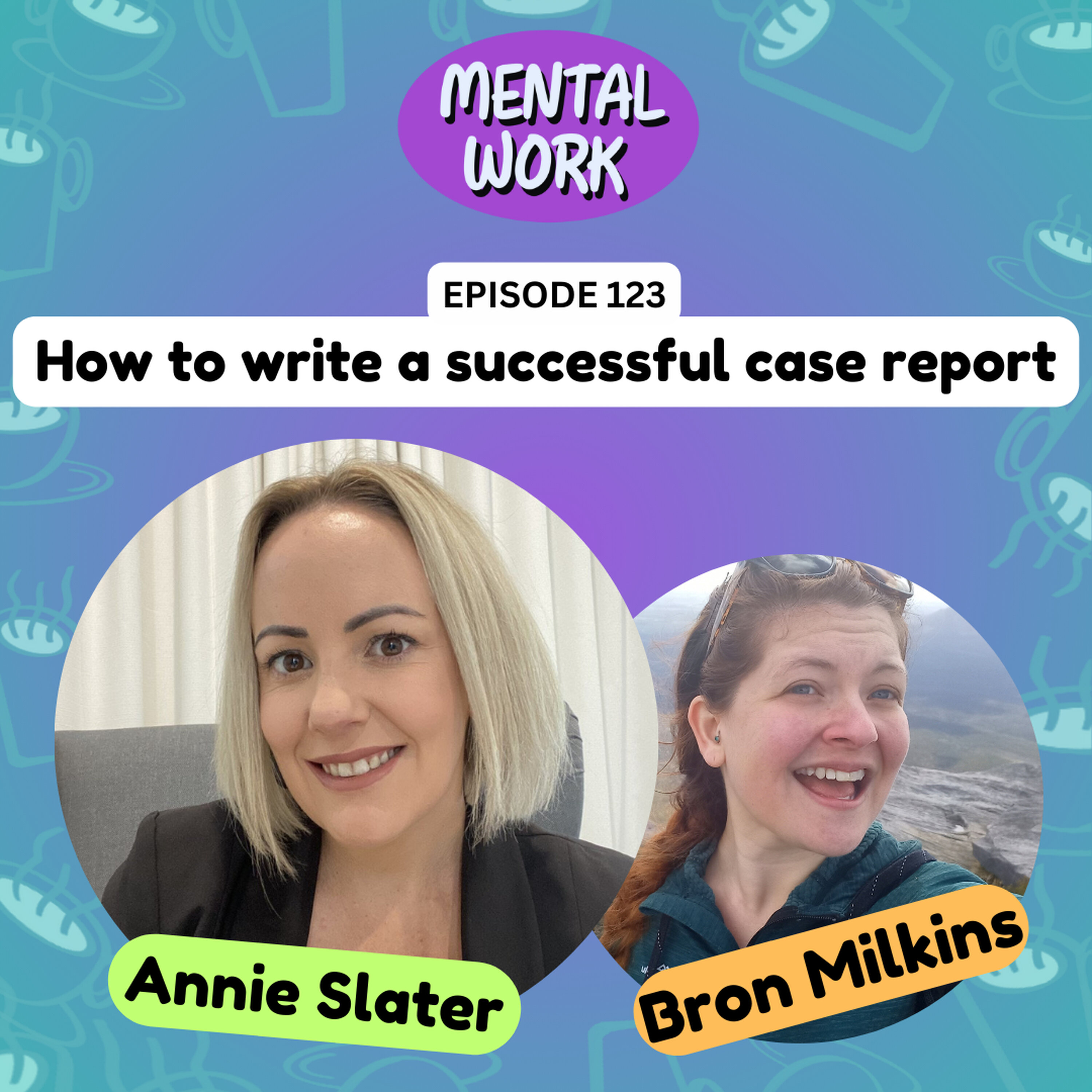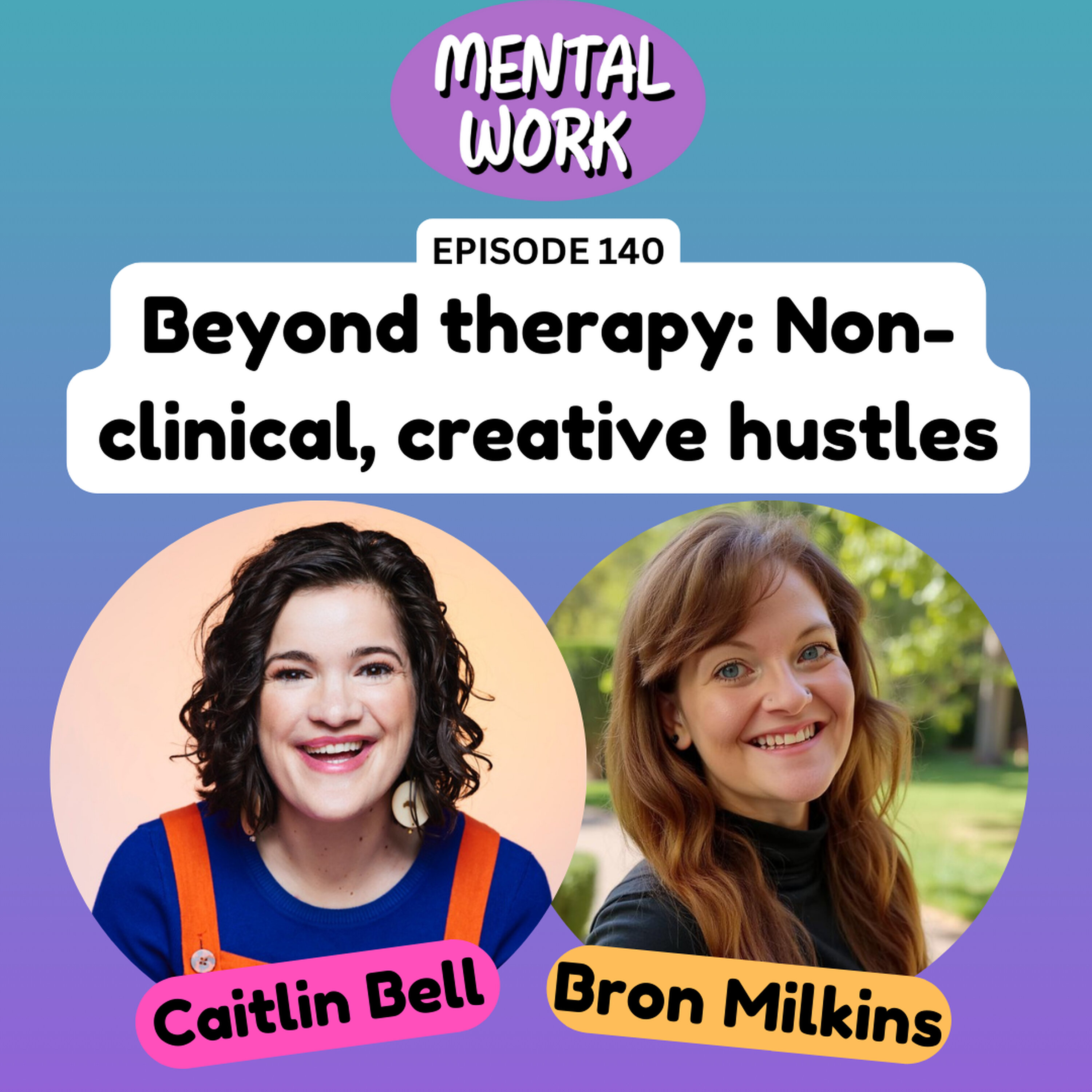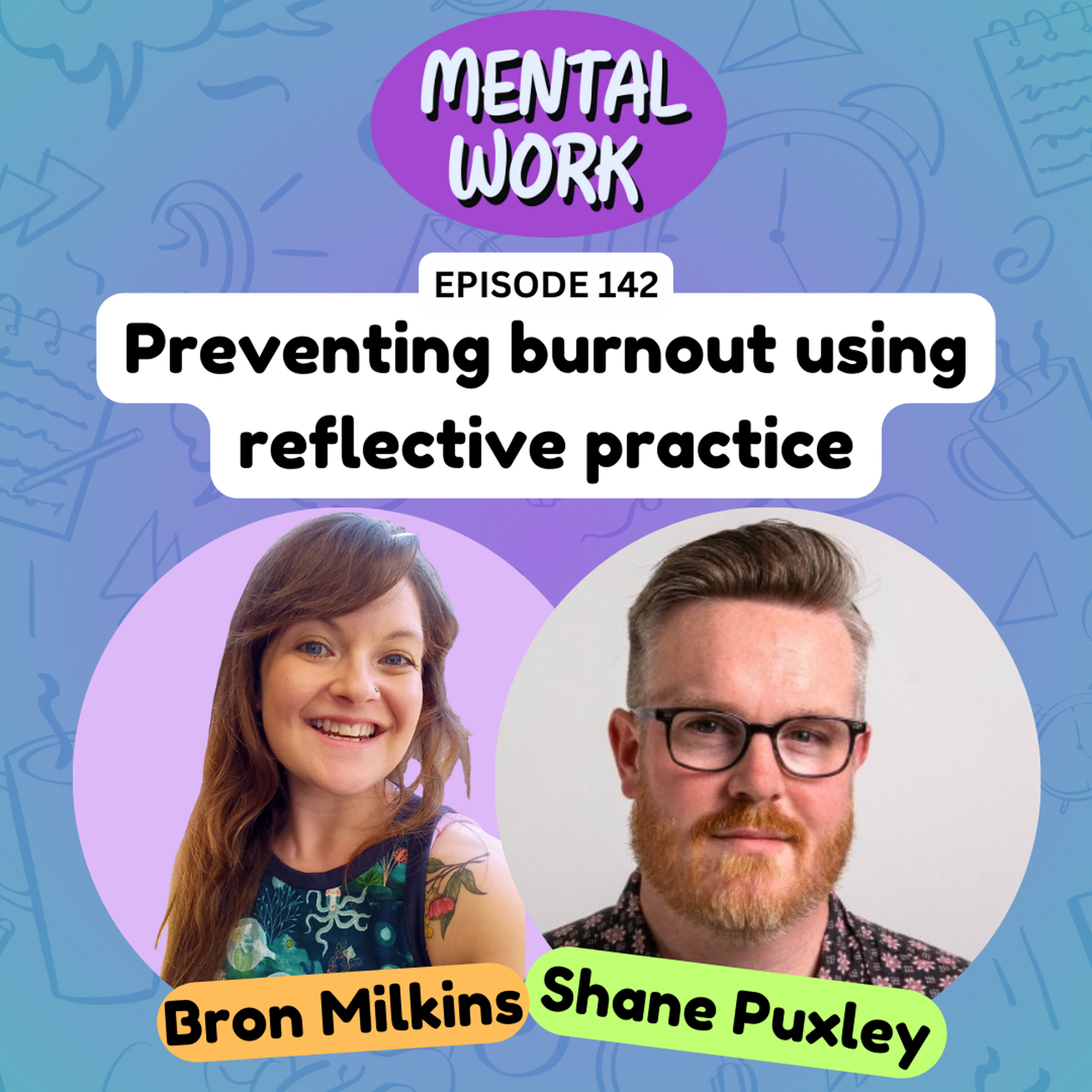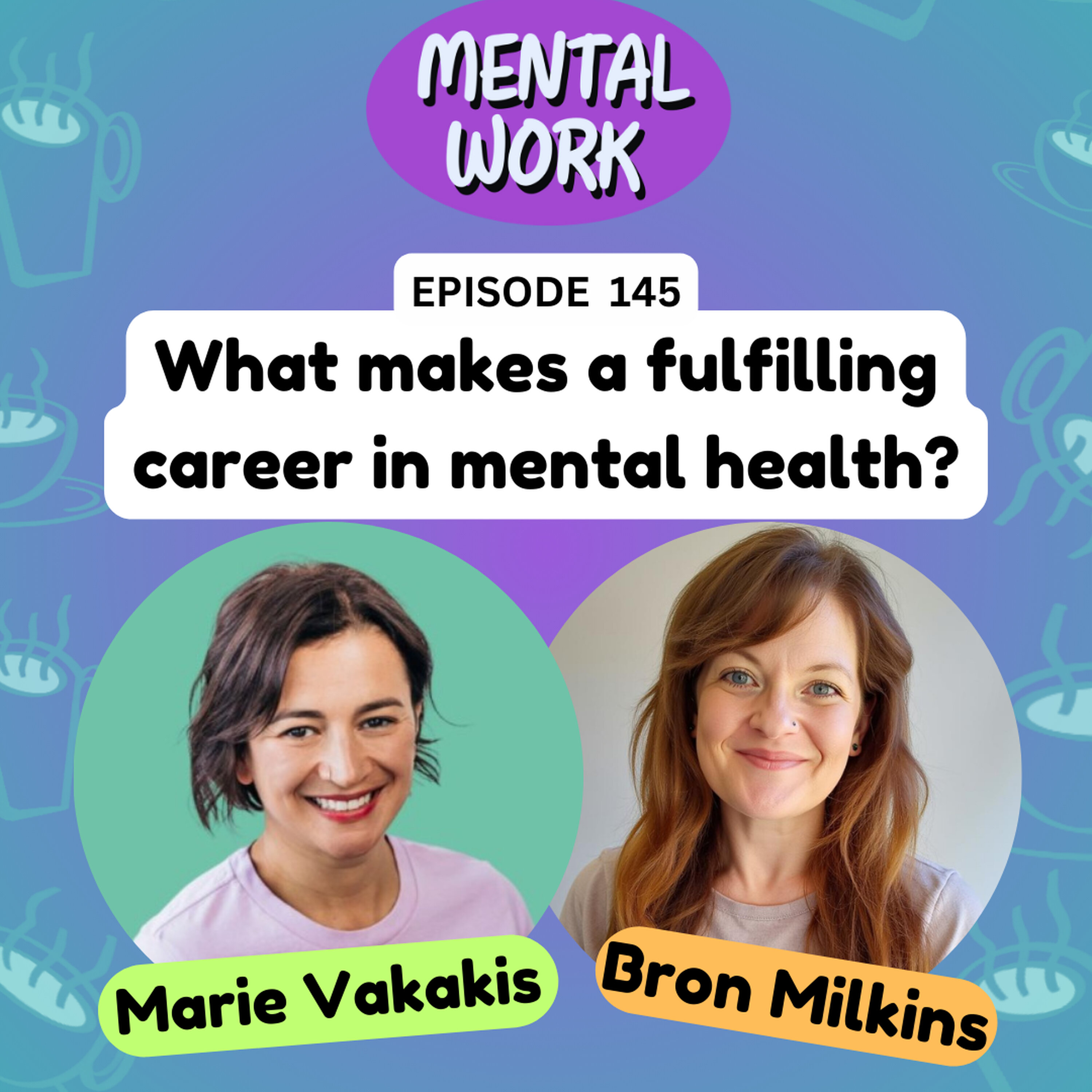BONUS: Harmful supervision

Recent studies have found that up to 62% of counselling professionals are receiving harmful supervision... but no-one is talking about it. In this episode, Bron unpacks what harmful supervision is, its impact on supervisee wellbeing and professional development, and what to do if you're receiving harmful supervision. Bron also discusses how to recognise inadequate vs harmful vs helpful supervision.
LINKS
- Bron is hosting our first online hangout on 16th July at 5:30pm AEST! Join the Patreon to chat about episodes and connect with other listeners here.
- Narratives of harmful clinical supervision: Synthesis and recommendations (2017)
- Narratives of harmful clinical supervision (2017)
- Post-degree clinical supervision for licensure: Occurrence of inadequate and harmful experiences among counselors (2021)
- Supervisees’ Perspectives of Inadequate, Harmful, and Exceptional Clinical Supervision: Are We Listening? (2023)
- The good, the bad, and the less than ideal in clinical supervision: a qualitative meta-analysis of supervisee experiences (2022)
- Supervision agreement (includes rights and responsibilities of supervisors and supervisees)
THE END BITS
Mental Work is your companion to early-career psychology, hosted by Dr Bronwyn Milkins.
Love the podcast? Please rate & review on Apple and Spotify.
Support the show by buying me a virtual coffee ☕
Sponsor the show for $2 a month on Patreon
Facebook / Instagram / YouTube (with captions & transcript) / Website / Apply to be a guest / Email Bron
CREDITS
Producer: Michael English
Music: Home
Disclaimer: The Mental Work podcast adheres to the APS Code of Ethics, the National Law, and relevant legislation. It provides informational, and entertainment content. Content should not be considered a replacement for professional consultation or therapy. The Mental Work podcast is not a psychological service and being a listener or participant does not establish a therapeutic relationship.
Opinions expressed are personal and subject to change, and do not represent those of any affiliated organisation. Efforts are made to ensure accuracy, but opinions may not always align with fact. Listeners are encouraged to thoughtfully assess the information presented and report any inaccuracies or concerns via email. Further information can be found here.
See omnystudio.com/listener for privacy information.
[00:00:00] Bronwyn: Hey, mental workers, you're listening to the Mental Work Podcast, your companion to early career psychology. As always, I'm your host, Dr. Bronwyn Milkins.
Today, we are talking about a really important topic, which is harmful supervision. Whether you're just starting out or have a few years under your belt, your supervision quality really impacts your development as a therapist and your wellbeing. Unfortunately, despite being ethically obligated to do no harm, the uncomfortable reality is that harmful supervision does occur, and it seems to be occurring more than we think.
But no one is talking about harmful supervision, particularly in Australia. I did a deep dive on the subject. That means I looked through databases and specific Australian psychology journals, and I couldn't find any research on harmful supervision in Australia, except for an unpublished doctoral thesis from 2007.
And if we're not talking about it, we can't change it. So the purpose of today's episode is to raise awareness about harmful supervision, help early career psychologists recognize harmful supervision, and reduce any feelings of shame and isolation that listeners who have experienced harmful supervision may have.
And with all of that out of the way, let me tell you what I'm going to cover. In a nutshell, we'll explore what constitutes harmful supervision, how to recognize it, and what to do if you're experiencing harmful or inadequate supervision.
All the information for this episode comes from peer reviewed published studies. I've read quite a few. There's a group in the U. S. led by researcher Dr. Michael Ellis, and they've been looking heavily at harmful supervision and developing a taxonomy for labeling supervisory behaviors that are harmful, inadequate, or helpful. Let's get crackin.
Scope of poor supervision
[00:01:53] Bronwyn: The first thing I want to look at is how big is the problem? So, a 2014 study conducted by Ellis and his colleagues found that roughly 40 percent of mental health supervisees in the U. S. and Ireland were currently experiencing harmful supervision. And that's pretty high, right? But wait, it gets worse. These stats refer to multiple instances of harmful supervision. When the researchers asked whether supervisees had experienced any occurrence of harmful supervision, the numbers skyrocket. 66 percent of US supervisees and 73 percent of Irish supervisees reported receiving harmful supervision.
And pretty equally disturbing is that supervisees don't seem to know when it's happening, with only about 7 percent of supervisees self identifying that they're receiving harmful supervision. So in these studies, what they do is they ask people to report behaviors, and then they categorize them as harmful, inadequate, or helpful.
The data really speaks for itself. This is not the only study. They've replicated these findings and what this tells us is that harmful supervision is unfortunately not uncommon. And what they've also found from a few studies is that it can really significantly impact your wellbeing.
Consequence of harmful supervision
[00:03:04] Bronwyn: Next, let's have a look at why supervision can be harmful because we're just seeking help from somebody who's more experienced in the field, right? But let's have a careful look here. There is a power differential, just like psychologists have between themselves and their clients. This also happens in the supervisory relationship.
And I would argue that early career psychologists and particularly, those who are in their internships or during their master's programs, they are very vulnerable because they don't have any relative experience for how supervision is supposed to go. There's also a lot of reliance on supervisors. So if you're doing your internship or a registrar program, you are very reliant on your supervisors to do your paperwork, to sign your log books and, in the case of internships, to pass your internship. So the evaluative nature of the supervisory relationship makes early career psychologists particularly vulnerable.
There is also the assumption that our supervisors are going to behave ethically, which means that early career psychologist, if something weird happens in supervision, they're more likely to blame themselves and assume that they're the ones at fault. And this can make them even less likely to bring up stuff that's happening in supervision, which may be inadequate or harmful, and the problem can go on without any resolution.
There's also another aspect of vulnerability that I wanted to speak to, and that's if you are a person of a marginalized identity. If you don't have a supervisor who is culturally aware, culturally humble, and responsive, then you may be at risk of micro or macro aggressions, or at risk of the harms that may come with not being aware and sensitive to your needs.
So next, let's have a look at what the consequences of harmful supervision are. I'm referring here to a 2017 study conducted by McNamara and their colleagues. What they did was they asked supervisees to write a narrative summary of their supervisory experiences. They asked heaps of people and they got heaps of narratives and what they did is they selected about 10 narratives that reflected the common themes that were showing up and the breadth of experiences. In every written narrative provided by a supervisee, a common experience was the enormous personal and professional self doubt caused by the supervisory experience. What they found was that supervisees didn't recognize the supervisor's behavior as harmful, rather they thought that the behavior was a reflection on them as a student and their failures.
So, the supervisees were thinking, 'Why haven't I been able to meet the standard? Why am I so bad at this? Maybe I'm not cut out for this profession.' Students internalized the blame for their negative supervision experiences. This made them feel even more isolated and silenced about their experience in their personal and professional lives.
They also feared that others would judge or blame them if they spoke up, or that their supervisor would retaliate, which would impact their career. So it was better from a survival perspective just to suck it up and keep going.
And it makes sense that we're going to internalize these experiences. We're socialized to trust and respect our supervisors. It also just doesn't make sense to us as supervisees. It can't be that the same person who is providing good supervision at times is also providing harmful supervision unless there's something wrong with me.
A lot of folks who submitted these written narratives of their supervision experience also mentioned that they wondered whether they were still going to work in the profession and they considered leaving. And about 7 percent of those in studies, not just this one, but others went on to actually leave the profession.
And that's a really sad loss because we've got a huge demand for mental health services. We spend so much time and money getting trained as a therapist. And it's really sad to that. We are leaving the profession because of these negative experiences.
Let's have a look at some of the emotional and psychological impacts. What they found in studies is that supervisees who experienced harmful supervision have a loss of safety and trust in the supervisory relationship. They feel powerless. They feel helpless. They feel anxious, depressed. They dread supervision. They've also said that it no longer feels safe to be vulnerable with their supervisor. So they put a lot of effort into managing their emotional reactions just to survive.
Some supervisees say that the experience impacted them on a deep level, and they felt very pathologized by their supervisors. One person whose narrative I read said, quote, "It feels like a brutal attack on who you are as a person".
And look, those are some of the short term consequences, but there are also long term effects. So you might be on the lookout for danger in the supervisory relationship. You might find it difficult to use supervision when you should get supervision because you're just not sure if you're going to get a good response. It really impacts people's professional development and their career trajectory.
And look, It doesn't just influence the therapist themselves, but there are also potential consequences for their clients. You might be at risk of providing substandard therapy because you can't get help on the things that you need help with in supervision.
I don't want to focus too much on it, but I have had a harmful supervisory experience, and I can tell you it took me about three years to recover from. And the long term effects for me were complete decimation of trust in every supervisor, unfortunately. And it did impact me to the point where it was difficult to seek supervision for the things that I really needed help with because I feared the supervisor would be judgmental or they wouldn't be able to assist me in the way that I needed without pathologizing me.
And I don't use that word harmful supervision lightly. The stuff I experienced, if you look at it objectively, and if you categorized in the taxonomy that researchers used, it really fits the bill. Thankfully, I've had some really good supervisory experiences that have genuinely helped to restore my trust in supervision.
So what I'm going to do now is I'm going to take you through some of the aspects of helpful supervision, inadequate supervision, and harmful supervision. Let's start out with what good supervision should look like. And again, this comes from the research. This study that I'm referring to in particular was led by Calero and colleagues and it was published in 2022. All the links to the research articles will be in the show notes. I really recommend you actually read them. They're quite informative and validating.
Helpful supervision
[00:09:18] Bronwyn: Helpful supervision includes: Your supervisor is available and interested in supervising you. It sounds simple, but it's really important. I've had so many stories of people being like, yeah, I haven't seen my supervisor for three months. Um, they're not available. They don't want to meet with me. And it's like, what? The other thing I've heard is supervisors who are not interested in supervising you, but they're doing it out of obligation or a favor to somebody else. So having a supervisor who's available, interested in supporting your professional development is key.
The other thing that's really important is a compatible style of supervision, professional background and interests. For me, the compatibility of the style of supervision is really important. I know some people really prefer non directive approaches. The idea being that if you provide someone with the space and psychological safety to be able to draw on their own experiences and their knowledge or put two and two together, that they can help guide themselves and increase their autonomy in that way.
For me, I prefer the opposite approach. I prefer a directive approach. And the reason for that relates to the way I think. I need the supervisor to tell me that I'm on the wrong track and I'm very happy to get back on the right track. So in my supervision, when I feel myself, it's when I'm asking questions and having the supervisor help me work out how to resolve those questions and pointing out my blind spots.
The other thing that's really important for a supervisor is to be competent to assist you in the setting and area of practice you work in. So if they're kind of Drawing at straws to help you. It's really important that they actually say, look, I'm not the best person for this. I wonder if somebody else might be more helpful in this area.
Another thing is that they provide clear expectations for supervision. What the research has found is that this is best facilitated through a supervision contract. But what the research has also found is that they're rarely used. So what we need to know is what's the scope of supervision? What are we actually talking about? What are we not talking about? What will each session look like? So what are the tasks? What are your responsibilities and what is the supervisor's responsibilities? It's kind of like what we do with clients, really.
A supervisor who is providing good supervision also demonstrates the ability to facilitate learning and develop your confidence in ethics and practice. That's really important because we all feel so dreadfully unconfident. I don't know if that's a word. It is now. And we really need a supervisor to help us out with that. A supervisor who is delivering helpful supervision shares knowledge and feedback that is clear, timely, and balanced. So they don't shit on you all in one go. And they say that in a kind way. A good supervisor also demonstrates humility and responsiveness to culture and diversity of supervisees. Finally, a good supervisor provides scaffolding and encourages autonomy.
These are just some of the elements. I've kind of shortened them a bit. And there are a few others, but these are the main ones. All in all, a good supervisor helps to create a supportive and respective environment that is psychologically safe. When people are receiving good supervision, the research tells us that they've got increased job satisfaction, increased professional confidence, and there's stronger therapeutic outcomes for clients.
Inadequate supervision
[00:12:15] Bronwyn: Let's turn to now the other side of the spectrum. So we're going to be talking about inadequate supervision first, and then harmful supervision. There is a, there is a difference.
Firstly, inadequate supervision is characterized by a few things. The supervisor is dismissive, overly critical, and does not offer guidance. They're not available to the supervisee, either physically, psychologically, or both. They are overly task focused, so they only focus on the things that you need to do rather than this personal dimension. So for example, your counter transference or what emotions are making it hard for you to do particular things in therapy, like repair ruptures that have occurred.
A supervisor providing an adequate supervision holds unreasonable expectations of their supervisees and they're unsupportive of their supervisees needs. They compromise the effectiveness and safety of supervision with dual roles. For example, they're a line manager and your supervisor, they're a therapist and your supervisor.
And I can tell you that This comes into the harmful category as well, I'll say a bit later, but this was one of the key things that really screwed with me when I was experiencing my harmful supervision. And I tried to point out to my supervisor the impact of that dual role, and they refused to say that that was an issue.
It's an issue. It's very confusing for the supervisee to be able to clarify who you're supposed to be and which role your supervisor is in. It can also make it really difficult to bring up things if you've got a business relationship or an employee relationship as well as a supervisee relationship, because you don't know if you're going to face repercussions from bringing things up about the workplace, for example, or your caseload . Supervisors who are providing inadequate clinical supervision also have supervision sessions that focus a lot on them and not the supervisee.
The other thing that supervisors who deliver inadequate supervision may have, is They lack competence in the relevant area and they deliver inconsistent, punitive, or unbalanced feedback. And for the punitive feedback, I will add that one of the aspects of being a supervisee is that it will be brought to our attention areas that we need to improve in and that can feel very painful. It can feel very punitive. It may not be actually punitive, but if you feel that it's punitive, I feel that it is important to raise that with your supervisor if you feel safe to do so. Because there may be an element of pathologization, of shaming that they may not be aware of.
Harmful supervision
[00:14:49] Bronwyn: Okay, let's contrast now inadequate supervision with harmful supervision. Here are the things that researchers have identified. Your supervisor is neglectful. So, they disregard or fail to fulfill their ethical responsibilities, like do no harm, leaving you and your clients at risk. They do not sign paperwork when they need to. They do not meet the criteria for how much supervision they need to deliver, which was agreed at the outset. They force you to disclose information you don't want to disclose, and they may use this information against you later as a reason for why you are unfit or why you are somehow deficient. They act indifferent or cold towards you or they do not talk to you at all. They are overly negative, belittling,or they publicly shame and humiliate you. I think another aspect of this is that if they observe you being bullied, they do not stick up for you or protect you.
They disregard the inherent hierarchy in the supervisory relationship, crossing boundaries or exploiting you for financial gain or any other gain. They are verbally or physically aggressive with you. They are defensive when you ask questions or provide feedback. They mistreat you emotionally, so they might play mind games and they might pathologize normal responses as being unfit for the profession.
This is something that I have heard of a lot with the pathologization of normal responses, such as crying or panic. So I've had listeners email me about this one in particular, and they've said, I cried in front of my supervisor and now they think that I'm unfit. I think it's good to honor your feelings. And I feel sad when those normal responses are pathologized.
Supervisors who provide harmful supervision are unable to regulate their own feelings and behaviors. So in a nutshell, your supervisor should always be professional towards you. And finally. Supervisors who deliver harmful supervision create an unsafe psychological environment. So you feel afraid to provide feedback, raise important issues, and you feel afraid to end the supervisory relationship.
They may also be judgmental or use a threatening tone with you, leading to fear of disciplinary action. They may also threaten to fail your placement or your course if you do not do certain things.
So these are absolutely red flags. I'm sure there are others that I've left out of the harmful or inadequate category, but these are just a few of them.
How to respond to harmful supervision
[00:17:06] Bronwyn: Let's move on now to what to do if you're experiencing harmful supervision. Maybe I read out all these things and you're like, tick, tick, tick, tick. That's all me. What to do is trust your instincts. If something feels off, discuss your situation with a professional you trust to get another perspective. What this means is don't automatically blame yourself or think that it's nothing or think that it's small. Discuss it. Get a better understanding of what supervision is supposed to look like with someone you trust. They may say, Oh no, that's entirely normal.
Another thing you can do is really know your rights and responsibilities as a supervisee, so you can better recognize when a harmful situation might be occurring. What I'll do is, these researchers, they have their own supervisory contract which outlines your rights and responsibilities, and I'll pop that in the show notes as well so that you can have a look at it.
Document every harmful experience with your supervisor. So write it down, including your attempts to resolve and manage the situation. When supervision is not plainly harmful, consider attempting to discuss your concerns with your supervisor. Of course, this relies on it being safe enough to do so, but if discussing your concerns with your supervisor just does not feel like a thing you can do or it's not safe, do seek support from other professionals you trust.
Where your supervisor is being obviously harmful, it is not your responsibility to defuse or resolve the situation. Consult with another professional or your professional body for guidance on leaving the harmful situation.
And I guess I'll take a pause here to discuss how I recovered from my harmful supervision experience because I didn't know it was happening at the time. What I did know is that something felt off and I tried to diffuse the situation by myself, which I think made things worse. The things that really helped with my harmful supervision experience is knowing that what was happening was wrong. So when I looked at the ethical guidelines and what supervisors are obligated to abide by, I could see clear violations of that.
Another thing that was really helpful, but probably won't occur in all situations, is that when I googled the supervisor, they actually had like five pages of bad reviews on patient websites. And that made me realize, ah, it wasn't me. But again, I feel like that's fortunate that I could have that external validation that my supervisor, well and truly, uh, was not great. But that won't happen all the time.
Another thing that really helped me recover from the harmful supervision experience was try again. Thankfully, when I did put myself out there, I had a psychologically safe environment, and I had a warm, supportive supervisor who I could ask questions to, who I could bring my professional concerns to, who I could bring my personal concerns to that were impacting my work.
After that initial helpful supervision experience, I then had two more supervisors who were excellent. And now I feel like I've got kind of a robust team of good supervisors who I can call upon. And that's helped me to feel less isolated. It's helped me to feel less ashamed. And it's really helped me to feel held in my professional work.
This didn't happen overnight. I would say it took me about two or three years to recover from the harmful supervision experience completely. But the thing is, is that I feel like it would be so great if we could talk about this more. I mean, that's why I'm doing the podcast episode so that we would know that way you're not alone in our experiences.
Suggestions for supervisors
[00:20:41] Bronwyn: Finally, I've got some hints and tips for supervisors. And again, this comes from the research literature. I'm really just summarizing what's in the papers, but if you're a supervisor and you want to know how you can help, here's how. So. Just be aware that supervisees often feel powerless to speak openly about harmful supervision because they fear retribution and judgment.
Don't tell supervisees that they simply need to speak up, rather proactively create a safe space to provide feedback and demonstrate non defensive openness to feedback. Check in with your supervisees how the supervisory relationship is going and if there's anything that needs to be different or anything that needs to continue. And tell them that you will still have positive regard for them, no matter what they say to you, that truly, truly it is a safe space to be able to communicate everything that they are thinking and feeling and experiencing as a psychologist.
The researchers recommend that you use a written supervision contract that covers the scope of supervision and rights and responsibilities of both parties.
Another thing that's recommended by researchers is to ask your supervisees about their past and present experiences of supervision to prevent ongoing or future harm and continue doing the things that were helpful.
I think this would be great. I'd actually love it if I was asked about my previous supervision experiences because then I could say what has been helpful for me. I mean, I do this with clients as well. I always ask my clients about their previous experiences with psychologists so I can continue doing the helpful thing and avoid doing the bad thing.
Finally, supervisors, you can be reflective of your interactions with supervisees. Were your actions in the best interest of your supervisee? Did you help their development as a practitioner in supervision? And did you avoid causing harm? These questions may be difficult to ask yourself and reflect on, but they are critical.
I know that there is some wounding that could happen. Maybe we think I should be more competent. I should be able to handle this, but we're all still learning. And so it's okay to be like, Oh, maybe that wasn't as helpful as I thought it was. And that's okay. It's all in the spirit of improving learning, repairing ruptures, and making sure that you're giving your supervisees who are very vulnerable, the best support that they deserve.
I just want to end the episode by reassuring you that if you have experienced harmful supervision and you are still blaming yourself you're not the problem. And you are not alone in your experiences. If you are currently experiencing harmful supervision, do you seek support from a trusted professional or your professional body? They're there to help you and advise you and make sure that you are on the right track.
Wrapping up
[00:23:15] Bronwyn: As I mentioned, I'll pop all the links to the research articles in the show notes. I hope this episode serves as a starting point for conversation, not the end of the conversation. I do think we need to talk about this topic much more.
Thank you. Listeners, as always, thank you for tuning into the Mental Work Podcast. I hope this episode was helpful for you. And if you enjoyed it, do give us a five star rating or review. It really does help get the podcast into more listeners ears.
Have a good one and catch you next time. Bye!




